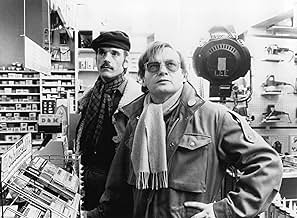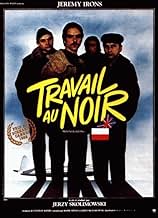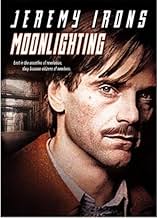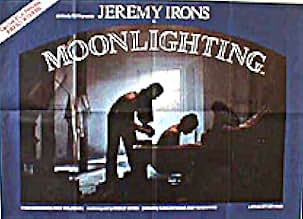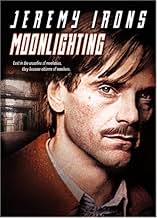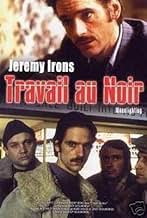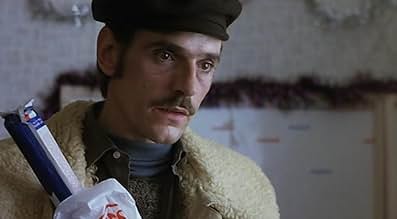Aggiungi una trama nella tua linguaNowak (Irons), a Polish contractor, leads a group of workmen to London so they can provide cheap labor for a government official based there. Nowak must manage the project and the men as the... Leggi tuttoNowak (Irons), a Polish contractor, leads a group of workmen to London so they can provide cheap labor for a government official based there. Nowak must manage the project and the men as they encounter the temptations of the West and loneliness and separation from their families.... Leggi tuttoNowak (Irons), a Polish contractor, leads a group of workmen to London so they can provide cheap labor for a government official based there. Nowak must manage the project and the men as they encounter the temptations of the West and loneliness and separation from their families. Nowak is the only one of the group who speaks English, and he uses this as a tool over hi... Leggi tutto
- Premi
- 3 vittorie e 3 candidature totali
- Wolski
- (as Jirí Stanislav)
- Builders' Merchant
- (as Mike Sarne)
Recensioni in evidenza
On the surface, the story is rather simple: sometime in the early 80's, during the political turmoil that was occurring in Poland, a group of Polish workers emigrate to London to renovate an apartment for their boss. They have no working permits, so they have to do their job with as much secrecy as possible. When Novak (Jeremy Irons), their English-speaking foreman, discovers that military law has been declared in their homeland, he tries to keep it a secret until they are allowed back into the country.
This may not seem like much of a story compared to most modern thrillers. There are no police out to get Novak and his men, nor are there any political opponents out to assassinate them. They are simply there to do their job, and Novak has to make sure they do it effectively and on time. Small but crucial subplots develop out of this: in order to feed himself and his men, Novak has to fake receipts for food (due to the limited amount of money they brought with them), and there are several scenes where he tries to get past the clerks at a grocery store with a Christmas turkey. He also has to buy them clothes and fulfill some of their material demands. On top of that, he also begins to develop fears and worries about his wife back home, including the suspicion that his boss may be having an affair with her. As the story progresses, Novak's money runs lower and his fear and paranoia grows stronger.
Because he is the only one of them who can speak English, Novak is the only one who can communicate with the outside world. But he is also very manipulative, and serves as a symbol of a government that misled their people and kept them ignorant of many of their own problems. It is interesting to see how Skolimowski develops sympathy for poor Novak; for all his intelligence, he is still nothing more than a pawn in the hands of a corrupt government. He is a stranger in a strange land, lost and faking his knowledge of his whereabouts. It would have been difficult to make this film convincing had the lead role not been played to perfection, but Jeremy Irons does it with more grace and skill than any other actor possibly could. Much of his performance is spent in narration, subtly explaining his growing confusion and terror. There are several moments where he keeps a perfectly straight face while rambling on in his head about the grave situation he is in. His performance here holds its own in a year that also included Dustin Hoffman in "Tootsie," Ben Kingsly in "Gandhi," Gerard Depardieu in "Danton," Paul Newman in "The Verdict," Jurgen Prochnow in "Das Boot," and Jack Lemmon in "Missing."
Like Andrej Wajda (who made "Man of Marble" and "Danton"), Jerzy Skolimowski was an outspoken critic of Poland's communist regime. Curiously, he wrote the script in only a little over a day, and the whole production of the film took only a matter of months. Furthermore, the three Polish workers accompanying Novak in the story were actual Polish emigrants living (legally) in Skolimowski's home at the time military law was declared. "Moonlighting" won a well deserved screenplay award at Cannes and was nominated for the Palme d'Or.
This film is on video, but I do not think it is still being circulated. I hope they re-release it on video or DVD someday.
Can see whole-heartedly why 'Moonlighting' was so highly recommended, and would do the very same with fellow Jeremy Irons fans who haven't yet seen the film or with anybody looking for a non-UK/US film to watch. It really is deserving of all the praise it gets and is actually deserving of more in my view, actually know a lot of people who haven't even heard of it let alone not seen it and that really should not be the case. Always try to be subjective and hate it when so many people try to force their opinions onto others, but it does irk me sometimes when you have so many heavily marketed films that are sometimes mediocre at best or ones that are good but not that much. And then you have a film as great as 'Moonlighting', one of the best films of its year and of its subject, that despite critical acclaim is not marketed enough. In favour of films that audiences are more likely to see and have concepts and stories that they may be more likely to warm to perhaps. That should not have been, or be, the case, it deserved much better than that.
Yes the deliberate pace may test the patience for some, it is wholly dependent on the viewer, but to me that was not in any way a fault. Do think that the very end could have been rounded off a little more, though the climactic moments are powerful and the final shot is unforgettable.
Visually, 'Moonlighting' looks good. The setting has a lot of atmosphere that fits the tone of the film ideally and it's filmed with grit and style while bringing a claustrophobic edge that helped make things more powerful. Jerzy Skolimowski, exiled at the time, directs assuredly and never loses the vigour. Furthermore the script is an intelligently written one with some humorously satirical moments in deadpan fashion, and while more familiarity with the subject may help the story enthralled, entertained and moved, with a few disturbing twists in the mix like the identity of the only one who knows what's really happening in Poland. The shoplighting sequence is a major highlight, and there is a fair share of tension and poignancy.
Absolutely agree with anybody who says Irons' performance here is one of his finest, both pre-'Lolita' (and then his career became hit and miss when it became increasingly difficult to tell what to do with him or find enough roles that played to his strengths, that's my take though) and ever. It is graceful and understated but also full of authority and not many people are as good as Irons too when it comes to narration. The other performances are all great, but Irons is the one that the viewer remembers.
In conclusion, really great. 9/10
A bunch of Polish builders arrive in London to renovate a house belonging to their boss. The foreman, Nowak, played quietly and brilliantly by Jeremy Irons, is the only one that speaks English. Their money is sufficient only for the tools, building materials and barely surviving.
This is a slow-burner film with every face hiding a deep anxiety, anger or fear, it's a wonderful experience for those who can appreciate true cinema. Irons carries the film single-handedly (often with inner monologue, since there are not many people to talk to) with few facial expressions but each one telling books of emotions.
You can literally taste the frustration of every character: the builders, working hard but not able to enjoy the western life that they finally see but cannot touch, are angry. (There's a very funny scene where one of them wants to buy Coca Cola on their first trip to the supermarket, exclaiming "Coke!" with childish glee, but their money is so limited that they can't afford even that.) The neighbors are angry, because the builders make too much noise. Most of all, Nowak is angry for a lot of reasons, although he never shows it: He misses his wife, and has growing doubts about the intentions of his boss about her. He speaks English, but doesn't always understand the subtleties of what the British people say. He has to deal with the men, the meager finances, the neighbors, the skip workers, and of course the house itself, which looks like it will come down if someone sneezes hard.
Two things change the course of their dull days dramatically: the money obviously won't last, and Nowak starts to come up with little schemes to get extra food from the supermarket using the same receipt. He's quite inept, but lady luck is often on his side. But most importantly, he hears that a military coup has taken place in his homeland. He faces a terrible dilemma: does he tell the men? He must, since they all have families at home, but then the work will never finish, and they really need the income. (There's no way they'll be allowed back, anyway) Or does he not tell them? Then the work may finish on time, but how will he keep the men from finding out themselves, when their weekly phone calls from home suddenly stop?
It's basically a hero story. What's a hero? A Marvel guy in leotards, speaking in one-liners? Or a man who does the right thing, at his own cost, knowing that he will never be appreciated? Nowak does the right thing. He hides the truth about the coup, thus keeping the men from rushing to the border and probably getting arrested. He gets the work done on time. He sees attractive women, but never chases them: they only remind him of how much he loves and misses his wife. He steals, but not from regular people: he only steals from the supermarket, and steals food and basic necessities only. And all the while he keeps his mouth shut. He doesn't "share his journey" or any other nonsensical stuff we love oh so much nowadays. He doesn't expect rewards, admiration, medals, approval, praise. He does the right thing, because he's a man, and that's what a man does. Even the final scene, where he tells the men about the coup and gets beaten by them for hiding the truth so long, is a tribute to this: He doesn't try to justify it, he knows he did the right thing but also hurt his men, so he takes their punches like a man.
As one other reviewer mentioned, it's a movie for the discerning viewer. There's nothing wrong with Marvel movies or action movies, but there's a lot wrong with thinking that's what movies are all about.
Lo sapevi?
- QuizSkolimowski's Kensington house in West London was in real life undergoing renovation at the time the film was made. (Moonligthing, 1982)
- BlooperWhen one of the workers paints the door frame on the outside of the building and clears away the electrical wire, part of the lintel is already painted white. Later, when Banaszak climbs up the ladder, the lintel has not yet been painted. Then, in the close-up in which he gets the electric shock, a good part of the lintel is painted white again, and in the next shot, when he falls off the ladder, only a tiny part is painted white again.
- ConnessioniFeatured in At the Movies: The Best Films of 1982 (1983)
I più visti
- How long is Moonlighting?Powered by Alexa
Dettagli
- Data di uscita
- Paese di origine
- Lingue
- Celebre anche come
- Moonlighting
- Luoghi delle riprese
- Aziende produttrici
- Vedi altri crediti dell’azienda su IMDbPro
Contribuisci a questa pagina


